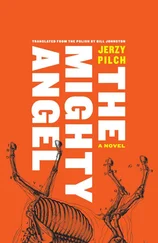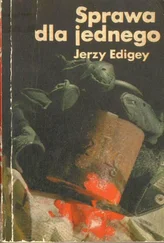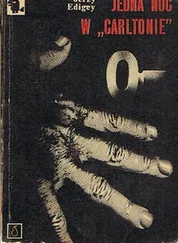We knew this tale, and we listened wearily to the irrefutable pieces of evidence: that, namely, if the Party secretary looks bad when he appears on television and delivers a speech full of pessimism and veiled threats toward Moscow, this is an infallible sign that his son is again demanding victims, that he can’t hold out any longer, that any time now he will escape, that the members of the Secret Police who are watching over him, if they won’t help him, then they will certainly turn a blind eye, and that in a few days, in a week, two at the most, next to the path leading from the Castle Hill to the stream, the corpse of a girl will again be found.
At this moment — precisely at this moment, when the words “corpse of a girl” were uttered, and when one of the seven indistinguishable narrators made a pause and adjusted his beret, and drank a tiny sip of beer, and wiped his lips with the back of his blackened hand, and lit up a Sport — at precisely this moment, the doors of Europa opened, and there appeared not the corpse of a girl, but a living, flesh-and-blood girl in a yellow bouclé blouse and a sky blue Perlon miniskirt, and she crossed the threshold. And after her, there appeared a second and a third and a fourth. And all of them crossed the threshold, and all of them walked in our direction, and all of them sat down at our table, and all of them — amused by our absolute dumbfoundedness — each and every one of them, ordered a small beer with raspberry juice.
“The entire matter is a political game of the Party,” one of the seven indistinguishable alcoholics continued his tale, but by then we were entirely uninterested in listening, or rather — now reconstructing those events and moods precisely — we began to listen with a delight that invalidated what we were listening to, for the delight that seized us — that, after all, the girls from the construction site had come, and not only had they come, but they had come decked out in their best, sexiest outfits; that they had put on their shortest skirts and their tightest blouses — the delight that seized us at their sight was so all-encompassing, that we listened, delighted, to the next installment of the story about the vampire. We were simply delighted by the fact that an irrefutable link between the bad appearance of the Party secretary and the later attacks of the vampire — always one, at most two, weeks later — had been established. We were in seventh heaven over the fact that the Party faction that was opposed to the secretary was spreading rumors that his son was a serial murderer. It pleased us no end that the faction that favored the secretary didn’t deny that, granted, his son is mentally ill and dangerous, but the secretary did not succumb to the pressures from Moscow and did not have him locked up in the loony bin; what is more, the one and the other thing are provocations of former members of the NKVD. We were fired with enthusiasm for the former members of the NKVD. We bought the narrator — who was amazed at our unexpected applause — beer after beer. We ourselves lost all sense of moderation. Nor was it necessary to try to persuade the girls — the small beer with juice was a thing of the past. They put it away like they really did have some sort of Dionysian genes, they laughed at our every word, a constant neon light arrested the turning of the earth.
Just as delicately as could be, I glided my hand along the thigh of the Goddess of Large-Slab Construction who was sitting next to me, I felt the hint of lime dust that inhered in her skin, I plunged my mouth into hair that smelled of sweet flag and hop shampoo. If at that moment someone should have made me choose between Gocha and her, I would probably have chosen Gocha, but I would have been in a quandary. I would have chosen Gocha, but it wouldn’t have been easy for me. I would have chosen Gocha, but with a heavy heart.
To this day, I have a hard time distinguishing — or rather, to tell the truth, I simply don’t distinguish at all — between eroticism and love, let along back then. When I finally write a Dictionary of Erotic Superstitions , the superstition about the necessity of distinguishing sex from love will occupy a prominent position. There is no such thing. Sex without love makes no sense and is — at least in my case — impossible. Sex without love is an unnecessary event. And don’t let anyone try to tell me that I simply ennoble copulation in a comic and naïve fashion. As far as I am concerned, there is no copulation that is not noble. Copulation is love. Love can last for years, and it can be like a lightning flash, and let no one remain in the delusion that the first is worth more than the second. All the more because it is usually the other way around. Ergo , you must love all the women with whom you wish to go to bed. You must fall in love with them, and you must make them fall in love with you. Whoever should have all the women in the world, but have not love, will be as sounding brass, or a tinkling cymbal. Even if you want to have a paid tart, you still have to love her, and it is no phony high-mindedness that speaks through me, rather a knowledge of the force of experiences.
Minute by minute, I was falling in love with the beautiful lady bricklayer sitting next to me. After an hour, two, or perhaps three — on the one hand, it is impossible to say precisely, since, as is well known, love stops, or perhaps even cancels time (after all, in writing metaphorically that the dead light of a dirty neon had stopped the turning of the Earth, I had already taken note of this fact); on the other hand, I think that I had fallen in love after more or less an hour — after two hours, that heroine of socialist labor was reciprocating my feelings; after three, we began to search for some secluded place. Actually, we didn’t have to make any decisions. Our feverish bodies and our intoxicated souls knew perfectly well by themselves that the most discrete place would be next to the path to the stream. The corpse that had been lying there for weeks had dissolved entirely and been eaten by the earth. Zero visibility, grass as high as a wall. Trembling bodies flowed into the depths of their own depths. The sky darkened over the dark brown globe, a red star flew in our direction, I felt the shiver of cold. “We lost so much time,” I said in a low voice, since, in spite of all, a whisper seemed to me too sentimental, “we lost so much time. The entire traineeship has passed… Why didn’t you want to go on a date with us earlier?” “We were afraid,” she said, smothering a laugh, and she hugged me by the neck, and she began, panting and laughing, to whisper into my ear. As she whispered to me, I recalled the beginning of the story, the first sentence, and the first day of the traineeship. We were driving to the construction site on an open truck. A fantastic, still summery day was rising. They sat across from us in a strange sort of tension, not saying a word. It was the beginning of a spectral September. In the environs of the little Austro-Hungarian town in which we performed our Workers’ Traineeship, a Silesian vampire was prowling, and at first the four female bricklayer’s assistants looked upon us with fear. Supposedly, of our entire five-some, the one who most looked like a vampire was Wittenberg (1953–1979).
The Double of Tolstoy’s Son-in-Law
I
When, in the autumn of 2002, I came upon a reproduction in the newspaper of an old photograph showing Lev Tolstoy playing chess, I had the feeling that something just wasn’t right. It is easy to say now that the icy shaft of a mystery had run through me, or that the goddess of incomprehensible coincidences had placed a significant kiss upon my brow, or that the sulfurous wings of the angel of darkness had brushed me — or something like that. Today it is easy, exceedingly easy, and, given my stylistic impulses, shockingly easy to say so. But at that time, none of these far reaching metaphors came to my mind. Every sepia-toned millimeter was exceedingly intense, but intensity is too little for a mystery.
Читать дальше












